1.1 Introduction
When a wife is accused of murdering her husband, the deceased’s family faces complex legal, financial, and emotional challenges. What Your Family Can Do If Your Wife Kills You as Indian law provides specific remedies to ensure justice while protecting the rights of surviving family members. This section outlines actionable steps families can take under criminal, civil, and inheritance laws, addressing both immediate and long-term consequences.
ALSO READ National Commission for Men Bill 2025: Understanding India’s New Legal Framework for Men’s Rights and Welfare
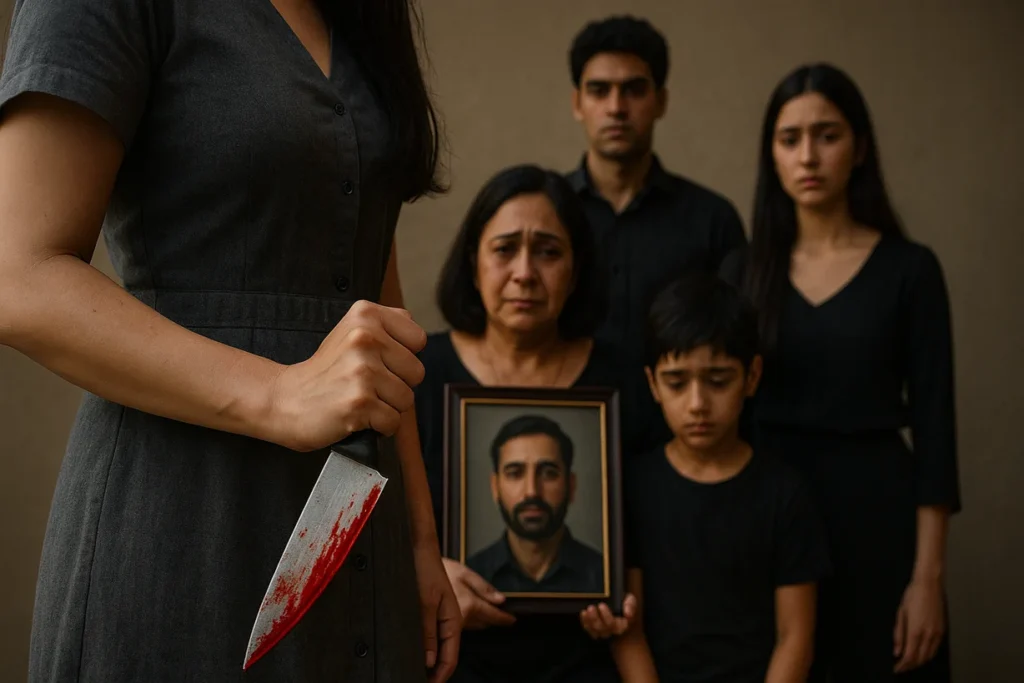
Table of Contents
1.2 Brief Overview of the question of What Your Family Can Do If Your Wife Kills You
Indian law treats spousal homicide as a severe offense under IPC Section 302 (murder), punishable by life imprisonment or the death penalty. However, the legal process involves multiple dimensions and you must be aware of What Your Family Can Do If Your Wife Kills You .
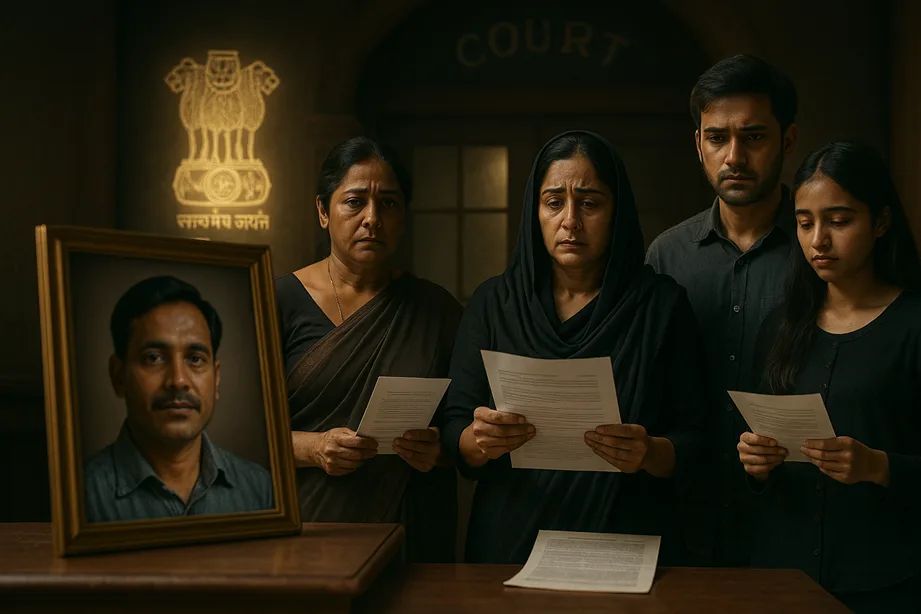
- Criminal Proceedings:
- The family must file an FIR immediately and cooperate with police investigations.
- Conviction requires proof beyond reasonable doubt, with trials often lasting 3–7 years.
- Inheritance Rights:
- A wife convicted of murdering her husband is disqualified from inheriting his property under Section 25 of the Hindu Succession Act, 1956.
- The Supreme Court reaffirmed this in K. Kunhiman vs State of Kerala (2017), barring murderers from benefiting from their crimes.
- Financial Implications:
- Family pension rules vary:
- If the wife’s conviction relates to the husband’s murder, she loses pension rights under Rule 4-A of Family Pension Rules, 1964.
- In Baljeet Kaur vs State of Haryana (2021), the Punjab & Haryana High Court clarified that pension suspension applies only if the murder relates to the spouse’s death.
- Family pension rules vary:
1.3 Importance of Knowing Legal Remedies for the Deceased Husband’s Family
Understanding these remedies is critical for three reasons:
1. Timely Justice:
- Delays in filing FIRs or preserving evidence (e.g., autopsy reports, witness statements) can weaken criminal cases.
2. Financial Protection:
- Families must proactively claim inheritance and pension rights. For example, if the wife is convicted, siblings or parents of the deceased can inherit property under intestate succession laws.
3. Child Welfare:
- Minor children’s custody typically shifts to paternal grandparents or other relatives if the mother is imprisoned, as per Section 6 of the Hindu Minority and Guardianship Act, 1956.
Case Example:
In a 2023 Delhi High Court ruling, the deceased’s parents successfully blocked their daughter-in-law’s inheritance by submitting her murder conviction certificate and invoking IPC Section 302
Understanding the Legal Framework
When families face the devastating situation where a wife is accused of murdering her husband, understanding What Your Family Can Do If Your Wife Kills You and the comprehensive legal framework becomes crucial for securing both criminal justice and protecting inheritance rights. Ever wondered Can the Wife Inherit Any Property After Killing Her Husband? The Indian legal system provides multiple layers of remedies through criminal law, civil procedures, and succession statutes that work together to ensure justice while safeguarding the deceased’s family interests.
The legal framework operates on two fundamental principles: first, that murder is among the gravest crimes warranting the severest punishment, and second, that a person cannot benefit from their own criminal act, particularly in matters of inheritance. This dual approach ensures that families have both immediate recourse through criminal proceedings and long-term protection of their rightful claims to the deceased’s estate.
we can also read 10 Legal Ways to Get Your Husband’s Property (Without Killing Him)
Definition of Murder Under Indian Law
Murder under Indian law is defined as the intentional killing of a human being with specific mental elements that distinguish it from other forms of homicide. The legal definition encompasses several critical components that prosecution must establish beyond reasonable doubt to secure a conviction.
Essential Elements of Murder:
Intentional Act: The accused must have knowingly committed an act with the potential to cause death. This element requires proof that the wife deliberately performed actions that could result in her husband’s death, whether through poisoning, physical violence, or other means.
Causation: There must be a direct or indirect causal link between the wife’s actions and the husband’s death. The prosecution must demonstrate that the death resulted from the accused’s conduct, not from intervening causes or pre-existing conditions.
Mental State Requirements: Indian law recognizes four distinct mental states that can constitute murder:
- Direct intention to cause death
- Intention to cause bodily injury known to be likely to cause death
- Intention to cause bodily injury sufficient in ordinary course to cause death
- Knowledge that the act is imminently dangerous and likely to cause death
Distinction from Culpable Homicide: Murder differs from culpable homicide primarily in the degree of intention and knowledge involved. While culpable homicide involves causing death with some intention or knowledge, murder requires a higher threshold of mental culpability. The Supreme Court in Virsa Singh v. State of Punjab clarified that for murder charges, the injury must be objectively sufficient to cause death in the ordinary course of nature.
Relevant Sections of the Indian Penal Code (IPC)
The IPC contains multiple interconnected sections that families must understand when a wife is accused of killing her husband. These provisions work together to provide comprehensive legal remedies covering different aspects of the crime and its consequences.
Primary Murder Provisions
Section 302 – Punishment for Murder: This section prescribes the punishment for murder as death or life imprisonment, along with liability for fine. When a wife is convicted under this section for her husband’s murder, she faces the most severe penalties under Indian law. The death penalty is reserved for “rarest of rare” cases involving exceptional brutality or circumstances that shock the collective conscience.
Section 300 – Murder Definition: This provision defines when culpable homicide amounts to murder, establishing the legal boundaries between different categories of unlawful killing. Section 300 contains five exceptions that can reduce a murder charge to culpable homicide, including grave and sudden provocation, private defense, and acts without premeditation.
Section 299 – Culpable Homicide: This section provides the foundational definition of culpable homicide, covering deaths caused with intention or knowledge of likelihood to cause death. Understanding this distinction is crucial as it affects both the severity of punishment and the family’s legal remedies.
Specialized Provisions for Domestic Violence
Section 304B – Dowry Death: This section specifically addresses deaths of women within seven years of marriage under suspicious circumstances related to dowry demands. When applicable in reverse situations or in cases involving broader domestic violence patterns, this provision demonstrates the legislature’s recognition of the serious nature of domestic homicides.
Section 498A – Cruelty by Husband or Relatives: While primarily protecting women, understanding this section helps families comprehend the broader framework of domestic violence laws and potential charges that might arise in complex family situations.
Section 306 – Abetment of Suicide: In cases where the husband’s death is claimed to be suicide but family suspects instigation by the wife, this section becomes relevant. It punishes those who abet suicide with imprisonment up to ten years and fine.
Supporting Criminal Law Provisions
Section 34 – Common Intention: When multiple family members of the wife are involved in the husband’s murder, this section allows for joint liability based on common intention. Recent Supreme Court decisions have clarified that each accused can be held liable for the collective criminal act when common intention is established.
Section 149 – Unlawful Assembly: In cases involving group violence against the husband, this provision enables prosecution of all participants in the unlawful assembly. The courts have held that individual liability can be established even when the specific role of each accused varies.
Procedural and Evidence Sections
Section 307 – Attempt to Murder: In situations where the husband survives an initial attack but later succumbs to injuries, charges often begin under this section before being enhanced to Section 302. Understanding this progression helps families anticipate the legal process and ensure proper evidence collection.
The interconnected nature of these provisions means that families dealing with a wife’s alleged murder of her husband must consider multiple legal angles simultaneously. Criminal proceedings under these sections directly impact inheritance rights, as conviction under Section 302 automatically triggers disqualification from succession under civil law. This comprehensive legal framework ensures that justice is served while protecting the legitimate interests of the deceased husband’s family members who seek both criminal accountability and preservation of their inheritance rights.
2. What Your Family Can Do If Your Wife Kills You: Immediate Steps
Filing a First Information Report (FIR)
The deceased husband’s family must act swiftly to initiate criminal proceedings:

- Visit the nearest police station to file a written complaint under Section 154 CrPC. For murder cases, police are legally obligated to register an FIR immediately.
- Key details to include:
- Exact time, location, and circumstances of death
- Witness accounts (if available)
- Prior history of domestic violence or threats.
- If police refuse, approach the Judicial Magistrate under Section 156(3) CrPC to order FIR registration.
Cooperating with Police Investigation
Families play a critical role in ensuring a thorough probe:
- Provide unrestricted access to:
- Medical reports and autopsy findings
- Digital evidence (call records, messages)
- Financial documents showing motive.
- Attend all interrogations but avoid direct confrontation with suspects.
- Demand crime scene preservation – police must seal the area and collect forensic samples like bloodstains or weapon residues.
Collecting and Preserving Evidence
Critical evidence types and preservation methods:
| Evidence Type | Action Required | Legal Reference |
|---|---|---|
| Physical Evidence | Photograph injuries/bruises on the body before cremation | Section 27, Evidence Act |
| Digital Trails | Secure CCTV footage, phone location data | IT Act, 2000 |
| Witness Statements | Record testimonies via affidavit | Section 161 CrPC |
- Medical Documentation:
- Obtain the postmortem report detailing cause/time of death.
- Request preservation of viscera samples for toxicology tests.
- Financial Paperwork:
- Freeze joint bank accounts via court order.
- Gather property deeds and insurance policies.
- Legal Safeguards:
- File Section 91 CrPC application to compel evidence preservation.
- Engage a criminal lawyer to monitor chain-of-custody protocols.
These steps ensure the family meets evidentiary standards under IPC Section 300 while blocking attempts to tamper with critical proof.
3. What Your Family Can Do If Your Wife Kills You: Criminal Proceedings
Role of the Police and Prosecution
The deceased’s family becomes the primary stakeholder in murder investigations under Indian law:
- Investigation Mandate:
- Police must file FIR under Section 154 CrPC within 24 hours of receiving murder complaints.
- As per State vs Navin Ahuja (Delhi HC, 2012), failure to register FIR allows families to approach the Magistrate under Section 156(3) CrPC for orders.
- Prosecution Duties:
- The Public Prosecutor must consult the family before accepting plea bargains or reducing charges.
- Families can demand reinvestigation if evidence is mishandled, citing Brij Bhushan Sharma vs State of UP (2000).
Key Police Actions Required
| Stage | Family’s Right | Legal Reference |
|---|---|---|
| Evidence Collection | Demand forensic analysis of weapons/clothes | Section 53 CrPC |
| Witness Protection | Request anonymity for vulnerable witnesses | SC Guidelines, 2021 |
| Chargesheet Filing | Obtain copy within 90 days | Section 173 CrPC |
Trial Process and Possible Outcomes
Murder trials follow a structured process with critical junctures for family intervention:
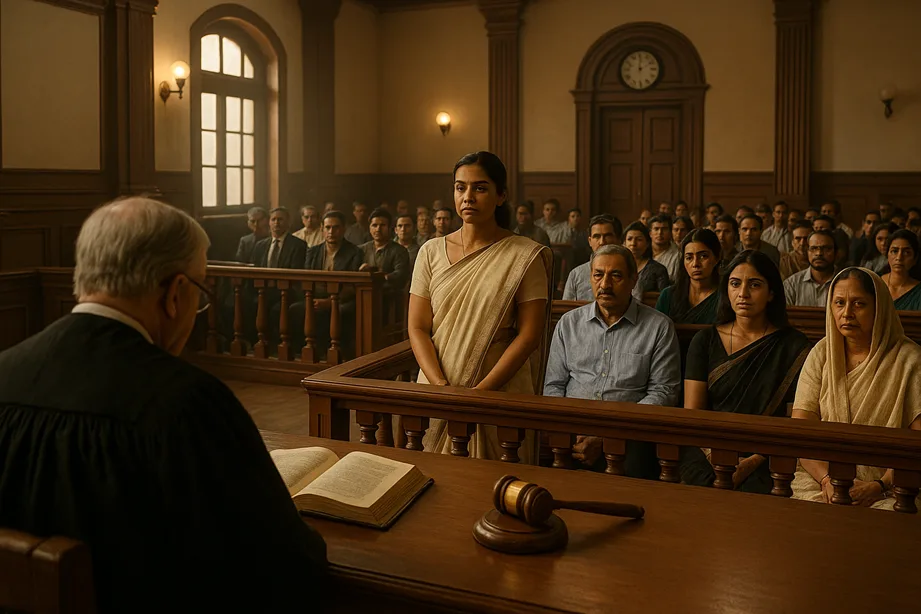
- Pre-Trial
- Families can file interlocutory applications to:
- Add charges under Section 216 CrPC
- Block bail via Section 439(1A) CrPC if the accused threatens witnesses.
- Families can file interlocutory applications to:
- Trial Phases
- Examination-in-Chief: Families provide witnesses (neighbors, doctors).
- Cross-Examination: Challenge defense claims using autopsy reports or digital evidence.
- Verdict OptionsOutcomeLegal ImpactCase ReferenceConviction (IPC 302)Life imprisonment/death penaltyState of TN vs Accused (SC, 2005)AcquittalFile appeal under Section 372 CrPCAllahabad HC Ruling, 2023
Rights of the Victim’s Family During Trial
The Allahabad High Court (2023) affirmed families’ rights to actively participate at all stages:
- Pre-Trial Rights
- Access investigation reports under RTI Act, 2005.
- Oppose bail via victim impact statements detailing emotional/financial losses.
- In-Trial Rights
- Cross-examine defense witnesses through lawyers.
- Submit Section 311 CrPC applications to recall hostile witnesses.
- Post-Trial Rights
- Claim compensation under Section 357A CrPC (Victim Compensation Scheme).
- Appeal acquittals within 90 days (Section 372 CrPC).
Case Example:
In Jahanvi Agarwal vs State (2023), the victim’s uncle secured retrial by proving police collusion, using call records and bank statements as evidence.
4. What Your Family Can Do If Your Wife Kills You: Inheritance and Succession Rights
Disqualification of the Murderer From Inheriting Property
Indian law imposes an absolute bar on convicted murderers inheriting their victim’s property. This principle applies even if the murderer is the deceased’s legal heir, ensuring no one profits from their crime. Key aspects include:
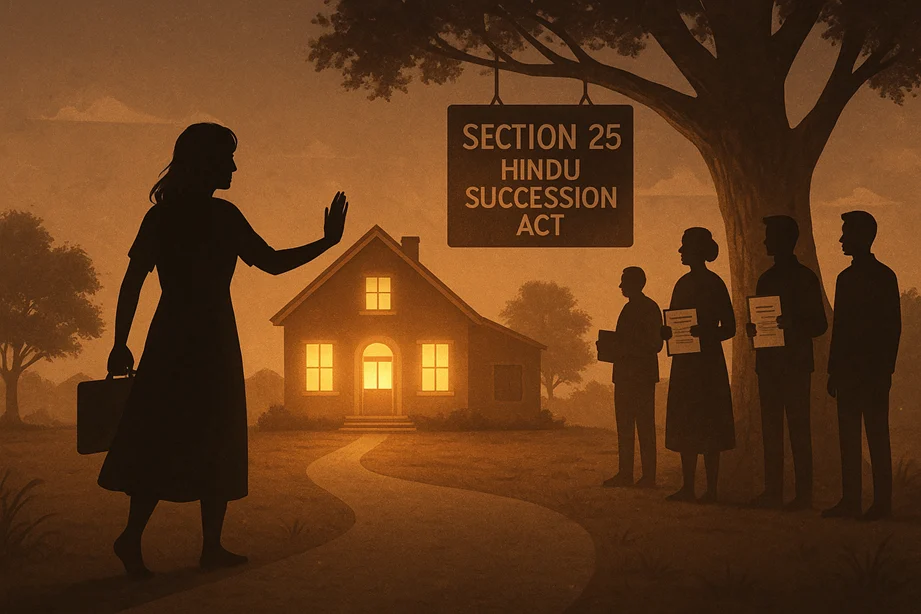
- Automatic Disqualification:
- A wife convicted of murdering her husband loses all inheritance rights to his property under Section 25 of the Hindu Succession Act, 1956.
- The Bombay High Court clarified this applies to dowry death convicts (State of Maharashtra vs Radha Giri, 2023), expanding the scope beyond technical murder charges.
- Legal Fiction:
- The law treats the convicted wife as predeceasing the victim, ensuring her descendants also lose inheritance rights (Nagarajan vs Nagammal, Supreme Court, 2011).
Application of Section 25, Hindu Succession Act, 1956
This provision codifies the public policy that criminals cannot benefit from their crimes:
| Scenario | Legal Consequence | Case Reference |
|---|---|---|
| Direct murder conviction | Full disqualification from victim’s property | K. Kunhiman vs State of Kerala (2017) |
| Abetment of murder | Equal disqualification | Sarvanabhavav vs Sallemmal (Madras HC) |
| Dowry death conviction | Disqualification under broad interpretation | Bombay HC, 2024 |
Key Features:
- Applies to all property types (ancestral, self-acquired).
- Requires civil court proof of murder/abetment, even without criminal conviction.
- Overrides wills: A murderer cannot inherit even if named in the victim’s will.
Rights of Other Legal Heirs to the Deceased Husband’s Estate
When the wife is disqualified, inheritance shifts to other Class I heirs under Section 8 of the Hindu Succession Act:
Priority of Succession:
- Children: Biological/adopted children inherit equally.
- Parents: Surviving parents share equally with children.
- Siblings: If no children/parents, siblings inherit.
Financial Protections:
- Family Pension: Disqualified wives lose pension rights under Rule 4-A, Family Pension Rules, 1964. Benefits transfer to children or parents.
- Joint Property: The convicted wife’s share in joint assets is forfeited (Minoti vs State, Bombay HC).
Comparative Inheritance Rights:
| Heir Status | Before Conviction | After Conviction |
|---|---|---|
| Wife | Full inheritance | Disqualified |
| Children | 50% share | 100% share |
| Parents | 0% (if wife alive) | 50% share |
Case Example:
In Jahanvi Agarwal vs State (2023), the deceased’s parents successfully claimed his entire estate after proving their daughter-in-law’s murder conviction, invoking Section 25.
5. What Your Family Can Do If Your Wife Kills You: Family Pension and Financial Benefits
Rules Regarding Family Pension for Government Employees
Family pension rules ensure financial support for dependents of deceased government employees. Key provisions include:
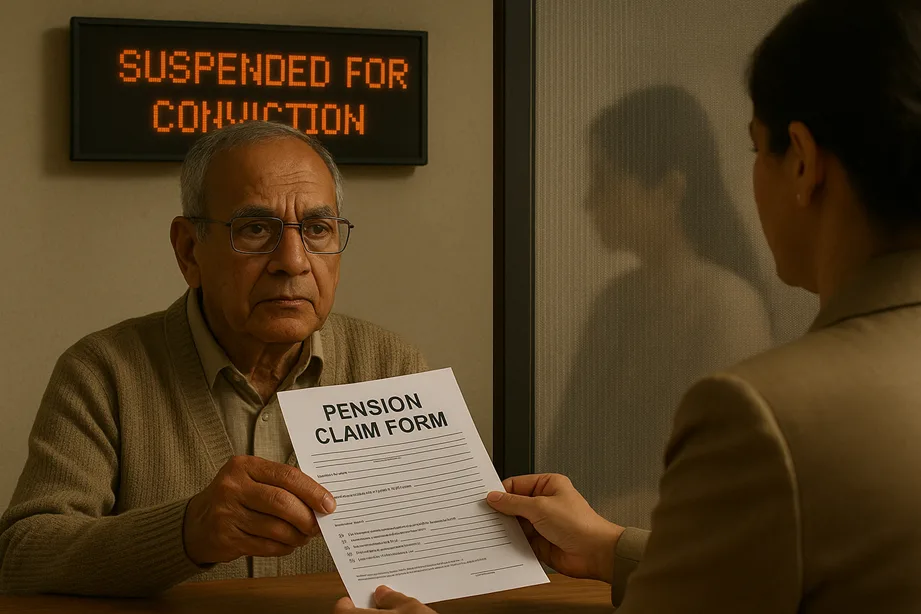
- Eligibility:
- Primary beneficiaries:
- Spouse (unless convicted of murdering the employee)
- Children below 25 years (or indefinitely if disabled)
- Dependent parents (if no surviving spouse/children).
- Primary beneficiaries:
- Payment Structure:ScenarioPension RateDurationDeath during service50% of last salaryFirst 10 yearsPost-retirement death50% of pensionFirst 7 yearsExtended period30% of last salary/pensionLifetime
- Documentation:
- Submit death certificate, Pension Payment Order (PPO), and KYC documents .
Suspension and Disqualification of Pension If Wife Is Convicted of Husband’s Murder
Indian law strictly bars convicted spouses from financial benefits:
- Immediate Suspension:
- Under Rule 50(14) of CCS (Pension) Rules, 2021, pension is suspended if the spouse is charged with murder. It transfers to other eligible heirs during trial .
- Permanent Disqualification:
- Conviction leads to complete disqualification under Rule 4-A of Family Pension Rules, 1964. The Punjab & Haryana High Court clarified this applies only if the murder relates to the spouse’s death (Baljeet Kaur vs State of Haryana, 2021) .
- Key Exceptions:
- If the spouse is acquitted, pension restarts from the date of death.
- Minor children receive pensions through court-appointed guardians (not the convicted parent).
Eligibility of Other Family Members for Pension and Benefits
When the wife is disqualified, pension shifts as follows:
Priority of Succession:
- Children:
- Receive pension until age 25 (or indefinitely if disabled).
- Unmarried/widowed daughters retain benefits for life.
- Parents:
- Mother receives first preference; father if mother is deceased.
Case Example:
In a 2023 Haryana case, the deceased’s parents successfully claimed his pension after proving their daughter-in-law’s murder conviction, invoking Rule 50(14).
Comparative Eligibility:
| Family Member | Eligibility Criteria | Pension Duration |
|---|---|---|
| Children | <25 years/unmarried | Till eligibility ends |
| Disabled Child | Medical certification | Lifetime |
| Parents | Dependency proof | Lifetime |
Financial Safeguards:
- Joint accounts: Frozen until legal heirs are confirmed.
- Taxation: ₹25,000 standard deduction under new tax regime.
6. What Your Family Can Do If Your Wife Kills You: Civil Remedies and Compensation
Filing for Compensation as Victims’ Family
Indian law provides dual avenues for financial redressal to families of murder victims:
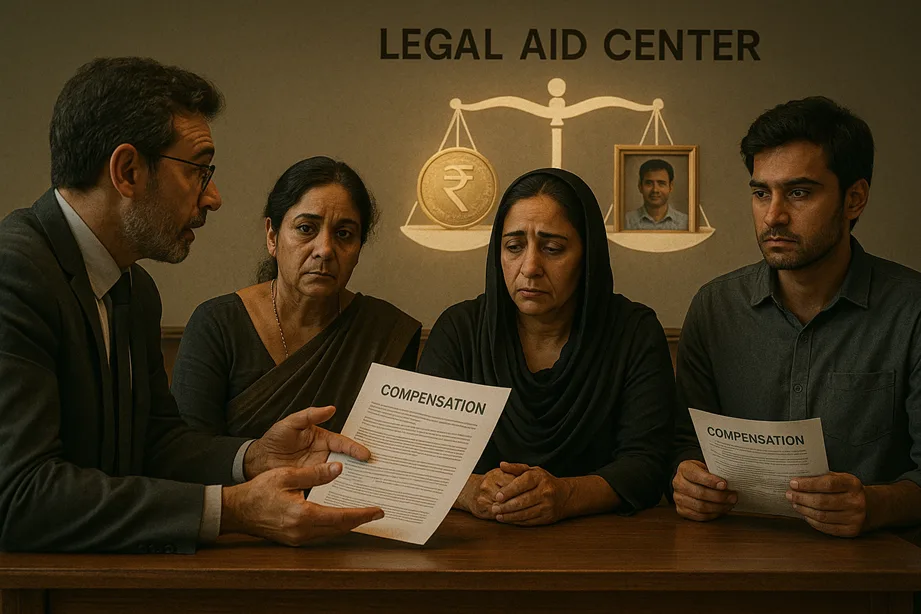
1. State Compensation Schemes
Under Section 357A CrPC, families can claim compensation through state-specific victim compensation funds:
| State Scheme | Maximum Compensation | Key Features |
|---|---|---|
| Maharashtra Manodhairya | ₹5 lakh | Covers murder, dowry death, and suicide abetment |
| Delhi Victim Compensation | ₹5 lakh | Requires FIR copy and death certificate |
| Karnataka Scheme | ₹5 lakh | Additional ₹25k for medical expenses pre-death |
Steps to Claim:
- File application with District Legal Services Authority (DLSA) within 3 years of the incident.
- Submit:
- FIR copy
- Postmortem report
- Proof of dependency (e.g., ration card).
- Request interim compensation (up to 50% of total) within 7 days under SC guidelines .
Case Example:
In Suba Singh vs State (SC, 2011), the court ordered ₹2.32 lakh compensation to a widow under the Fatal Accidents Act, 1855, despite the law’s limitations .
Other Civil Claims Against the Convict
Families can pursue parallel civil lawsuits for damages beyond state compensation:
1. Wrongful Death Suits
File under Section 1A of the Fatal Accidents Act, 1855 to claim:
- Loss of financial support (deceased’s income)
- Funeral expenses (up to ₹20,000 under Karnataka Scheme)
- Loss of consortium (marital companionship).
2. Tort Claims
Seek damages for:
| Tort | Compensation Basis | Case Reference |
|---|---|---|
| Intentional Infliction | Emotional distress | Jagannath Singh vs State (Allahabad HC) |
| Loss of Estate | Value of deceased’s assets | Harmail Singh Case (Punjab HC) |
3. Property Recovery
- Initiate Section 144 CrPC proceedings to reclaim joint assets from the convict.
- Use civil court injunctions to freeze the convict’s bank accounts.
Key Precedent:
The Delhi High Court awarded ₹30 lakh in Dilbagh Singh Case (2023) for loss of income from a murdered businessman, setting a benchmark for economic damage claims .
Comparative Remedies
| Remedy | Scope | Timeframe |
|---|---|---|
| State Compensation | Fixed amounts (₹2–5 lakh) | 3–6 months |
| Civil Lawsuits | Custom damages (up to ₹30 lakh) | 2–5 years |
Legal Strategy:
- Combine Section 357A CrPC claims with civil suits for maximum recovery.
- Use conviction certificates from criminal trials as evidence in civil courts.
This framework empowers families to secure financial justice while holding perpetrators accountable through multiple legal channels.emedies and Compensation
- Filing for compensation as victims’ family
- Other civil claims against the convict
7. What Your Family Can Do If Your Wife Kills You: Custody and Welfare of Children
Custody Rights If Children Are Minors
Indian courts prioritize the welfare of children over parental rights when deciding custody in homicide cases:
- Disqualification of Convicted Parents:
- A mother convicted of murdering the father loses custody rights under Section 6 of the Hindu Minority and Guardianship Act (HMGA), 1956. The Allahabad High Court ruled that custody cannot be granted to a parent facing murder charges until acquitted (Awadhesh Gautam Case, 2020).
- For children under 5, custody “ordinarily” goes to the mother under HMGA’s proviso. However, this reverses if she is the perpetrator (Roxann Sharma vs Arun Sharma, SC, 2015).
- Shift to Legal Guardians:
- When both parents are unfit, courts grant custody to:
- Paternal or maternal grandparents
- Siblings (if adults)
- State-appointed guardians under the Guardians and Wards Act, 1890.
- When both parents are unfit, courts grant custody to:
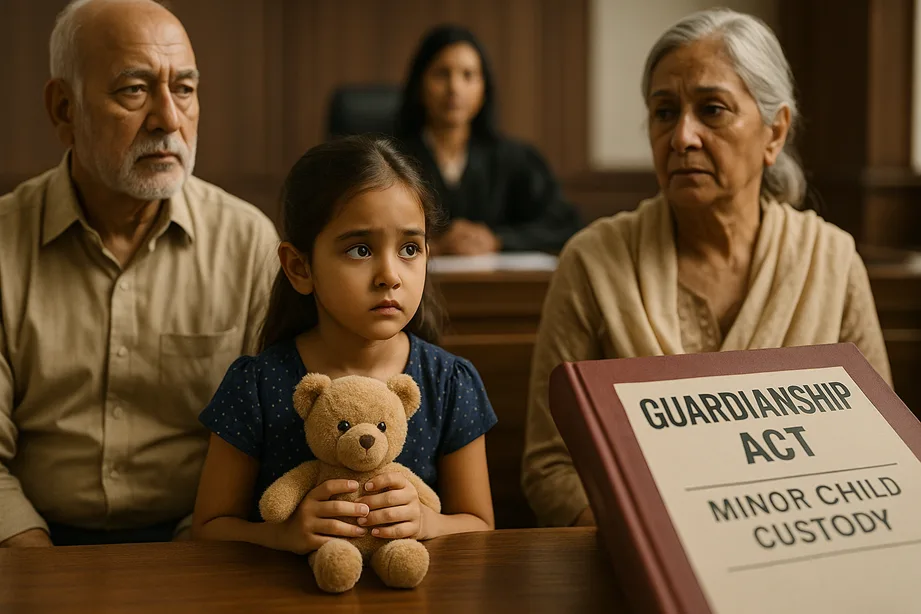
Case Examples:
- The Allahabad HC denied custody to a father accused of murdering his wife, citing the children’s fear of him (Awadhesh Gautam Case) .
- The Himachal Pradesh HC granted custody to a mother after the father’s suicide, despite dowry death allegations (Lajwanti vs Priti Devi, 2023) .
Role of Guardianship Laws in Such Cases
Guardianship laws provide a structured framework for custody disputes:
1. Hindu Minority and Guardianship Act, 1956:
| Scenario | Custody Rule | Legal Reference |
|---|---|---|
| Convicted mother | Custody shifts to father’s relatives | Section 6(a), HMGA |
| Both parents dead | Grandparents become natural guardians | Somprabha Rana Case, SC, 2024 |
| Child <5 years | Maternal custody unless mother is unfit | Proviso to Section 6, HMGA |
2. Judicial Safeguards:
- Courts assess:
- Criminal charges against parents
- Children’s preferences (if >12 years)
- Financial stability of guardians
- The Supreme Court mandates custody disputes be resolved under the Guardians and Wards Act, 1890, not through habeas corpus petitions (Somprabha Rana Case) .
3. Comparative Custody Outcomes:
| Situation | Typical Custody Grant | Case Reference |
|---|---|---|
| Mother convicted | Paternal grandparents | Allahabad HC, 2020 |
| Father deceased, mother acquitted | Maternal custody | Himachal Pradesh HC, 2023 |
| Both parents convicted | State guardianship | GW Act, 1890 |
Key Precedent:
The Allahabad HC barred a murder-accused father from visitation rights, emphasizing that criminal charges create an “atmosphere of threat” detrimental to children’s welfare .
8. What Your Family Can Do If Your Wife Kills You: Key Legal Remedies
Summary of All Available Legal Actions
What Your Family Can Do If Your Wife Kills You , under Indian law provides a multi-layered approach to ensure justice and protect families’ rights in spousal homicide cases:
| Legal Remedy | Purpose | Key Laws/Cases |
|---|---|---|
| Criminal Prosecution | Secure conviction under murder charges | IPC Section 302, State of TN vs Accused (SC, 2005) |
| Inheritance Disqualification | Block convicted spouse from property rights | Section 25, Hindu Succession Act; K. Kunhiman vs State of Kerala (2017) |
| Family Pension Suspension | Transfer financial benefits to legitimate heirs | Rule 4-A, Family Pension Rules; Baljeet Kaur vs State of Haryana (2021) |
| Civil Compensation | Claim financial redressal for wrongful death | Section 357A CrPC; Suba Singh vs State (SC, 2011) |
| Child Custody | Ensure minors’ welfare post-conviction | Section 6, HMGA; Roxann Sharma vs Arun Sharma (SC, 2015) |

Note: While courts generally disqualify convicted spouses from pensions, exceptions exist. The Punjab & Haryana High Court ruled in Baljinder Kaur vs State (2025) that family pensions remain payable as social security, even post-conviction, if the murder isn’t directly linked to pension claims.
Practical Steps for the Family to Secure Justice
- Immediate Legal Actions:
- File FIR under Section 154 CrPC within 24 hours.
- Preserve digital evidence (CCTV, messages) using IT Act, 2000.
- Financial Safeguards:
- Freeze joint accounts via civil court injunction.
- Apply for interim pension under Rule 50(14) of CCS (Pension) Rules.
- Long-Term Strategies:
- File civil compensation claims within 3 years (Section 357A CrPC).
- Initiate property succession proceedings under Section 8, Hindu Succession Act.
- Child Welfare:
- Petition for guardianship under Guardians and Wards Act, 1890.
- Submit school records and medical reports to prove parental unfitness.
Checklist for Families:
- ☑ FIR copy and postmortem report
- ☑ Witness affidavits (Section 161 CrPC)
- ☑ Legal heir certificate for property claims
Case Strategy:
In Jyoti & Sachin vs State (2024), the Gurgaon court convicted the wife and accomplice using the victim’s dying declaration and call records. This highlights the importance of digital evidence in securing convictions.
9. Frequently Asked Questions

Can the wife inherit any property after conviction?
No, if the wife is convicted of murdering her husband, she is disqualified from inheriting his property under Section 25 of the Hindu Succession Act, 1956. This legal bar is absolute: the law treats the murderer as if she predeceased the victim, so she and her direct descendants through the marriage cannot claim any share in the deceased husband’s estate. The Bombay High Court has clarified that this disqualification also extends to convictions for dowry death, not just murder. In summary, once convicted, the wife loses all rights to inherit from her husband’s estate.
Who gets the family pension if the wife is convicted?
If the wife is convicted of murdering her husband, she is generally disqualified from receiving the family pension. According to the Family Pension Rules, 1964, and as clarified by judicial precedent, the claim of such a person remains suspended during the criminal proceedings and, upon conviction, is barred. However, there have been unusual judgments, such as by the Punjab and Haryana High Court, where the court initially ruled that the wife could still be eligible for pension even after conviction.
Despite this, the prevailing legal position is that the pension should be transferred to other eligible family members, such as children or dependent parents, after the wife’s disqualification. The rules are designed to prevent a convicted spouse from benefiting financially from their crime.
What happens to joint property?
When the wife is convicted of murdering her husband, her share in joint property is forfeited. She is treated as if she predeceased the husband for succession purposes, and thus cannot claim any right in the jointly held property. The remaining legal heirs—such as the children, parents, or siblings of the deceased—become entitled to his share of the property. Importantly, under Section 27 of the Hindu Succession Act, 1956, any person disqualified from inheriting (due to murder) is considered as having died before the intestate, so the property passes to the next eligible heirs.
If the property was jointly owned, the wife’s interest may be severed, and the deceased husband’s share will devolve according to succession laws, excluding the convicted wife. Befor even considering the question What Your Family Can Do If Your Wife Kills You it is better to know that Divorce is better than being killed by your wife.
[…] extends beyond mere property rights to encompass all forms of succession benefits. Also be aware of What Your Family Can Do If Your Wife Kills You […]
[…] Adultery is no longer a criminal offence in India after the five-judge Constitution bench observed that, Section 497 is a denial of substantive equality as it perpetuates the subordinate status ascribed to women in marriage and society. Chief Justice of India (CJI) Dipak Misra said Adultery in Marriages can be a ground for divorce but not a criminal offence. Supreme Court struck down Section 497 of the Indian Penal Code (IPC) in Joseph Shine v. Union of India (2018). The Court ruled that criminalizing Adultery in Marriages violated Articles 14 (equality), 15 (non-discrimination), and 21 (privacy) of the Constitution . However, it remains a valid ground for divorce and can impact civil matters like maintenance and custody. Must also be aware of What Your Family Can Do If Your Wife Kills You […]
[…] You can’t file a criminal case against the third party anymore. But you can file for divorce. But also be aware What Your Family Can Do If Your Wife Kills You […]
[…] What Your Family Can Do If Your Wife Kills You […]